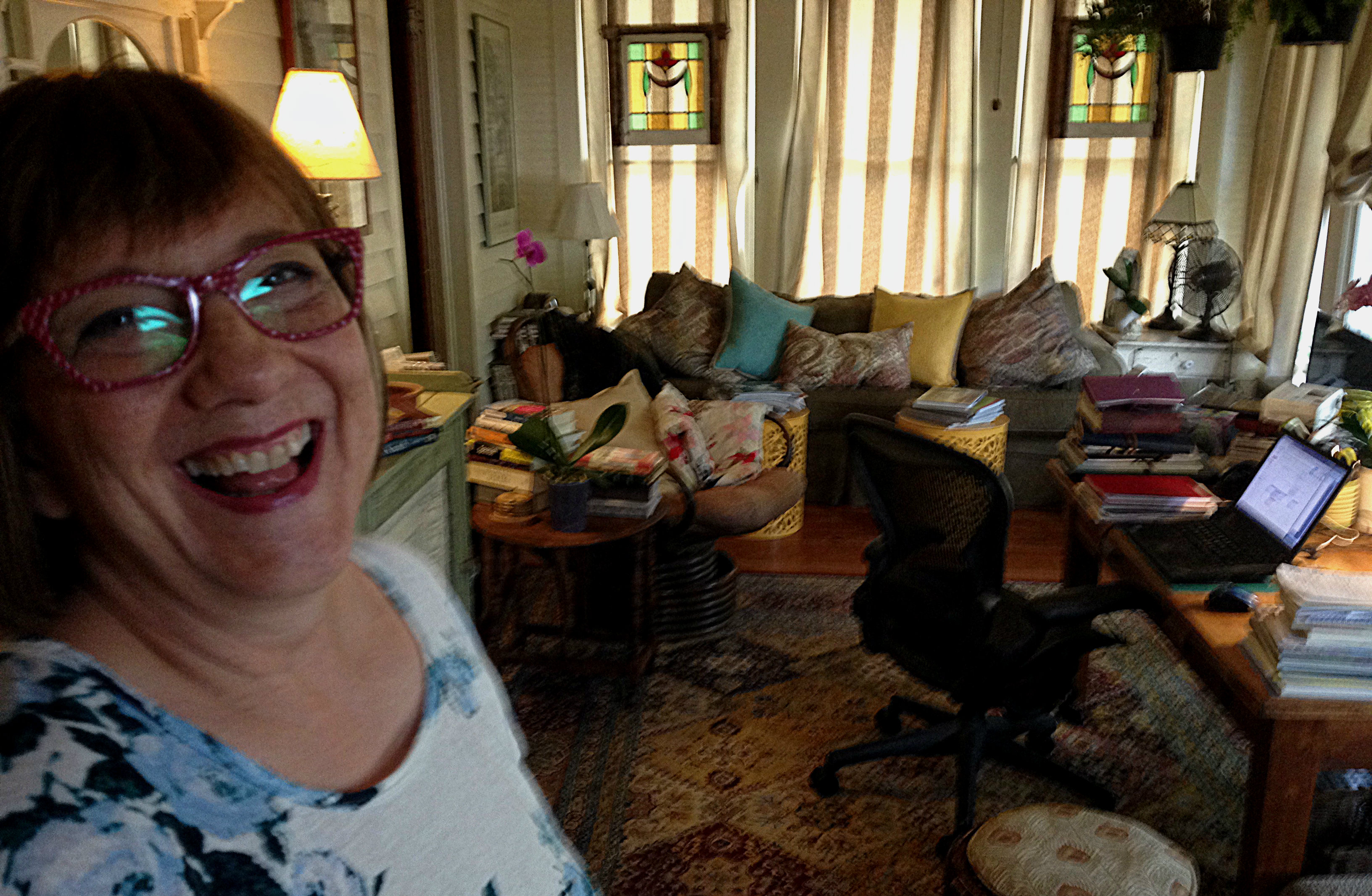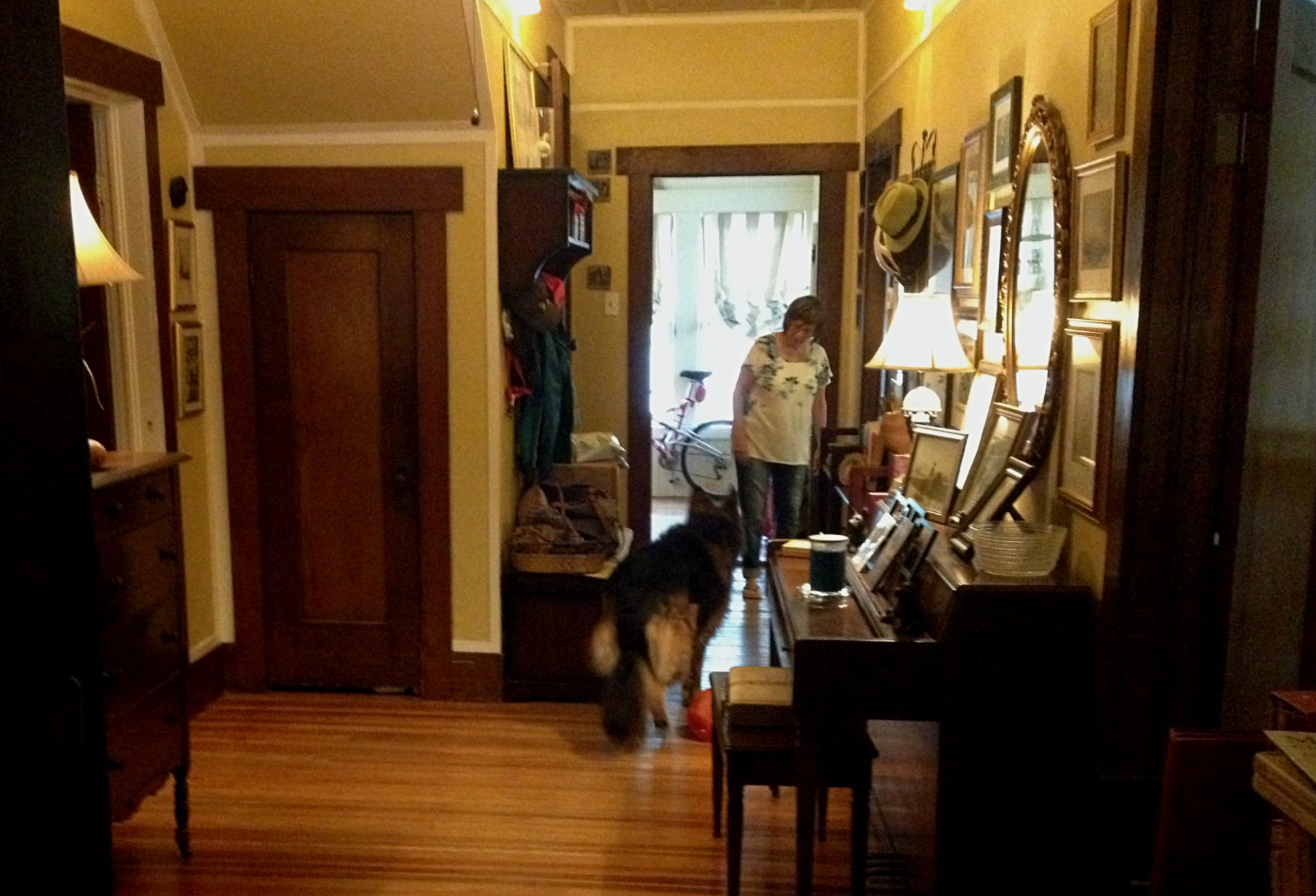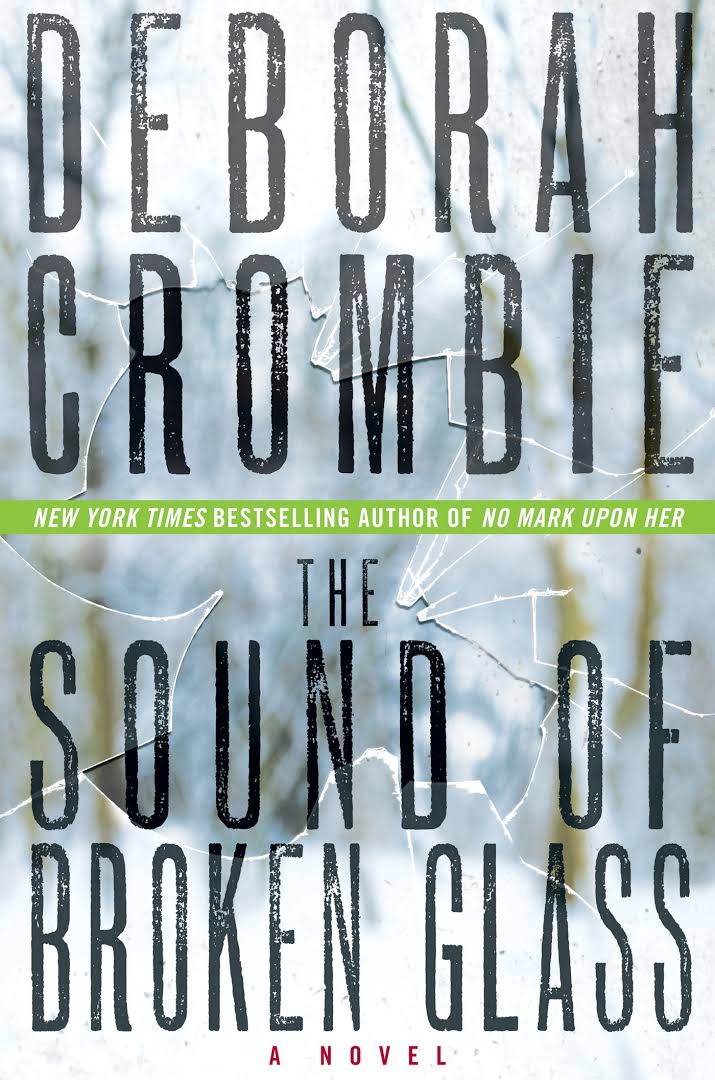Solving England’s Murders – From McKinney, Texas
ArtandSeek.net September 21, 2017 26Welcome to the Art&Seek Artist Spotlight. Every Thursday, here and on KERA FM, we’ll explore the personal journey of a different North Texas creative. As it grows, this site, artandseek.org/spotlight, will eventually paint a collective portrait of our artistic community. Check out all the artists we’ve profiled.

Deborah Crombie’s home in McKinney. Photo: Deborah Crombie
Deborah Crombie couldn’t be more of a North Texas native. Born in Dallas, grew up in Richardson, graduated from college in Sherman. And she lives in a century-old home in McKinney. Yet from Germany to Japan, Spain to the UK, the North Texas writer is known as the best-selling author of 17 police novels, all of them lovingly set . . . in England. For this week’s Artist Spotlight, Jerome Weeks sat down for some tea with Crombie.
The wood-frame house with its carefully tended yard looks perfectly peaceful but doesn’t sound like it. Not with two full-sized German Shepherds competing with each other to warn everyone in earshot a stranger’s approaching. “Hush!” says Deborah Crombie to Dax and Jasmine. “Hush! Where’s your ball?” She tries to distract them. “Where’s your ball?” No luck. They insist on participating in our conversation. So the 65-year-old author lures the dogs to another room and shuts the door.
“It’s a lovely old home,” I remark once it’s clear I can be heard. “It is,” Crombie says happily. “It is.” She should be proud. The house is 105 years old and has undergone extensive renovations. Now it’s filled with antiques, Persian rugs, a tiled fireplace and beamed ceilings. Crombie herself likes to write in the converted sleeping porch in the back, filled with sunlight and a view of her garden.
“Actually, I have an office upstairs,” she says with a laugh. “But I haven’t used it in about a year.”

Crombie’s crime novels feature a married pair of London detectives. Given that, and her cozy home, you might think her books are classic, quaint British whodunits, all tea shops and — even more tea shops. Actually, they’re police procedurals: full of ordinary legwork, office politics, closed-circuit TV surveillance, interrogations and forensic tests.
But still, they do have a strong domestic texture. The heart of the series is the relationship between detectives Duncan Kincaid and Gemma James. Over the course of the series so far, we’ve seen them meet as colleagues, have an affair, eventually marry. And now they wrestle with the demands of a blended family and Scotland Yard. As a result, the Kincaid-James novels are almost a hybrid – not crime novels, as Crombie says, but novels with crimes in them.
This, for instance, is a typical moment at home, the opening of Chapter 9 in Crombie’s 2014 novel, ‘To Dwell in Darkness.’
Gemma woke him with a gentle touch on his shoulder. As he sat up, startled, she said, trying not to laugh, ‘I think I could make you a bit more comfortable.’
‘I didn’t mean to fall asleep.’ Kincaid seemed disoriented and smelled faintly of beer. He gestured toward the cat.
‘It’s just she seemed so glad of my company.’
‘Write what you know’ is the standard advice given authors. For Crombie, it’s been ‘write what you love.’
That’s because back in 1976, after she’d graduated from college, Crombie visited England — “and I just fell madly, passionately, crazy in love with Britain.”
Eventually, she met and married a Scotsman, Peter Crombie, and emigrated to the UK. When they returned to Texas in the late ‘80s, Crombie set out to become a novelist, inspired by British mystery writers like P.D. James. Among other things – like attending Rice University’s old Publishing Program, modeled on the famous Radcliffe Publishing Course – she took a 17-week continuing-ed course from the late sci-fi author Warren Norwood.
“He was a great teacher,” Crombie says, “but he was tough. The first chapters I turned in I was so proud of, and they came back with great big red UGHS scrawled all over them. But by the time I finished the course, the last thing I turned in, he wrote on it, ‘This is publishable. Go for it.’”
She did.
After it passed through the hands of various editors and publishing houses, ‘A Share in Death’ came out in 1993. Most would-be writers think getting into print that first time is the Big Win. It wasn’t for Crombie.
“The first few books in the US, they didn’t make more than a couple thousand dollars,” she says. “But the foreign contracts were real money. Which was a huge, huge thing for me. I got divorced because I knew I could support my daughter. Just a complete new life.”
Gigi Norwood is the widow of Warren Norwood, and a friend of Crombie’s. She says Crombie’s matured as a writer. Her first novel, ‘A Share in Death,’ is the closest thing she’s written to a classic, English country-manor murder mystery, complete with a (rental) house in the country stocked with potential suspects. Since then, though, her novels have tackled increasingly grimmer, even distinctly big-city issues like immigration, gentrification, public protests.
‘Dreaming of the Bones,’ her fifth novel, is often cited as her breakthrough — more complex, with historical echoes. ‘The New York Times’ named it a Notable Book of the Year and it was short-listed for an Edgar. It’s true Kincaid-James series is not as grim or noir-ish — if that’s your taste — as the police procedurals of Ian Rankin’s Inspector Rebus or the Martin Beck series from Maj Sjöwall and Per Wahlöö.
“But there’s some gritty stuff in there,” Norwood notes. “We’ve had child trafficking and bombings and terrorism and corruption in the British police force.”
It’s clear Crombie is keeping up-to-date with a rapidly changing, more diverse London (which is one reason, she says, the few complaints about accuracy she gets come from British ex-pats who simply haven’t been in the city lately). So how does this North Texas writer get so many details right? The homey touches, the changing neighborhoods, the media scandals, the uproar inside Scotland Yard?

Deborah and Dax in the hallway. No, the interview is not about you. Photo: Jerome Weeks
Crombie visits England every year, sometimes twice a year. Often staying a month or more. “She goes really deep in her research,” says Norwood. “When she did the book about competitive rowing, she went and stayed at the Leander Rowing Club and made friends with a guy who’d been on the British Olympic rowing team. I think it’s that stuff that really makes her books come alive.”
And Crombie can write it all off as a professional expense.
“I have like a second life in England now,” she says. “When I wrote that first book, my idea was that I’d have these detectives in England, and I could do the research and it would be tax deductible. And now I think, ‘How was I so smart?’”
But if she loves England so much, why doesn’t Crombie and her current husband, Rick Wilson, simply move there?
Well, she has lived there already — and found herself “dreadfully homesick” for Texas.
“I’ve always been a little bit split. I love where I live,” she says. “But I started writing books set in Britain because I was here and I missed it. So if I lived there all the time, I don’t know if I would be as driven to live there in my imagination.”
So oddly enough, it’s the not-so-mean streets of McKinney, Texas that inspire Crombie’s dreams of murder in London.
Crombie’s Bibliography:
- “A Share in Death” (1993)
- “All Shall be Well” (1994)
- “Leave the Grave Green” (1995)
- “Mourn Not Your Dead” (1996)
- “Dreaming of the Bones” (1997)
- “Kissed a Sad Goodbye” (1999)
- “A Finer End” (2001)
- “And Justice There is None” (2002)
- “Now May You Weep” (2003)
- “In a Dark House” (2005)
- “Water Like a Stone” (2007)
- “Where Memories Lie” (2008)
- “Necessary as Blood” (2009)
- “No Mark upon Her” (2012)
- “The Sound of Broken Glass” (2013)
- “To Dwell in Darkness” (2014)
- “Garden of Lamentations” (2017)
What did you study in college?
Biology.
Why biology?
I was just interested in everything, and I was fascinated just by synthesis. Just the way everything in the world works together. My heroes were animal behaviorists and people like Konrad Lorenz and Jane Goodall. I wanted to be an animal behaviorist. Probably an ornithologist.
I went to Austin College [in Sherman], where the biology department is really tough. There’s a lot of pre-med. When I managed to struggle my way through, I applied to grad school. I applied to Cornell and to the University of Oklahoma because they have the best graduate programs in animal behavior, and I didn’t get in because I am math impaired. I was one of those people who on standardized tests — SAT, GRE, whatever — I would score like 100th percentile on the verbal and 20th percentile on the quantitative [laughs]. So even with a really good grade point average and recommendations, my scores were not good enough to get me into the schools I wanted to go to. So I just said, well, all right. I worked in the family business for awhile [the theater concession business – movie popcorn, etc.].

Crombie’s living room. Photo: Jerome Weeks
When did you first call yourself a novelist? Not, you know,’ I liked to write stories as a kid,’ but this is my career.
I guess not until I sold my first novel in 1992 [‘A Share in Death’]. It was published in 1993. Even for a couple of years after that, it felt like a very strange thing to put ‘writer’ down on a form. What do you do? I’m . . a writer. I did think at the start that it would be a series, three novels. But I can’t believe I’ve been doing this for 25 years. Never thought really past that first impulse, ‘Gee, I want to see if I can write a book.’
Have you given up anything to pursue your writing?
You know, when I wrote that first book, my idea was that I would have these detectives that would go to different parts of England. I could do the research, and it would be tax-deductible. Now I think, how was I so smart? [laughs]
Because it’s true. I get to spend part of every year in this country that I absolutely adore and could probably never afford to live in, but one of the biggest things I have now is this huge circle of friends. So rather than shrinking my social life, writing has just expanded it enormously. I think crime writers, unlike writers in other genres, tend to be really supportive of one another and tend to have a very cohesive community. At least in my experience. So I’ve got friends all over. I have a second life in England now because I have friends in different parts of England. So it’s just like I go and I just sort of pick up this other life.
What do you do to help you get started writing every day — or at least on the days you do write?
Oh, tea. I’m a big tea drinker. The coffee is kind of a recent thing. Trying to drink coffee in the morning and tea in the afternoon. But the tea is kind of a ritual thing — to make a cup of tea and then sit down at the computer or sit down with a notebook. No music. Except for the barking dogs, we’re generally a quiet house. We don’t ever have television on during the day.
I was going to ask, do you write in this kind of silence every day all by yourself in the house?
Yeah. Well, the center room there is kind of a shared office, so a lot of the time Rick [Wilson, her husband] is in there doing stuff. But lately, I’ve been writing in the sleeping porch. It’s just so sunny and pretty there.

Banned from the interview, one dog eavesdrops. Photo: Jerome Weeks
What does he do?
He works on computers. He does computer security and builds web pages, including mine, which is nice, I think. But I’m also a good coffee shop writer.
Any particular coffee shop?
No, I can write at Starbucks or Panera. I love Pappadeaux — I treat myself sometimes when I have to go into Dallas, I’ll stop on the way back. I like to sit at the bar at Pappadeaux with my notebook or my laptop. There’s just something about the atmosphere that I really like. Not to mention the oysters. [laughs]
Are you creatively satisfied?
Oh, I think there are still a lot of books I would like to write. There are some ideas that have been floating around for a few years that I just haven’t got to quite the right place.
Non-series books? Books not about Duncan or Gemma?
No, not really. People always ask that, ‘Don’t you want to do something that’s non-series?’ And I don’t really because I’ve got this expanding cast of characters, and I can move them around. I can bring in new characters that are really the focus of a crime in a lot of books. That’s kind of the way I think about them — as novels with crimes in them. But there are others things I’m interested in. I’m still fascinated by a lot of what got me into biology in the first place: Darwin, a lot of Victorian thinking and ideas. I like doing this sort of interplay of historical backstories with the modern, but everything just has to come together.
A lot of the times, I go to England, and I just want to be by myself all day. It’s quiet, and if I want to just get up and write in my pajamas, which I never do here because the dogs have to go out and we live on a corner that is like in the middle of McKinney and you don’t walk out on the front porch in your pajamas when everybody in town drives by. But in England, I can stay by myself in a flat — usually a hotel room or a flat — all day. And write.
If there’s anything I would add to my life I think it would just be the ability to be more focused on writing. I’m definitely not tired of writing.
It’s still magic.
Interview questions and answers have been edited for brevity and clarity. Images up top and out front: shutterstock.com












